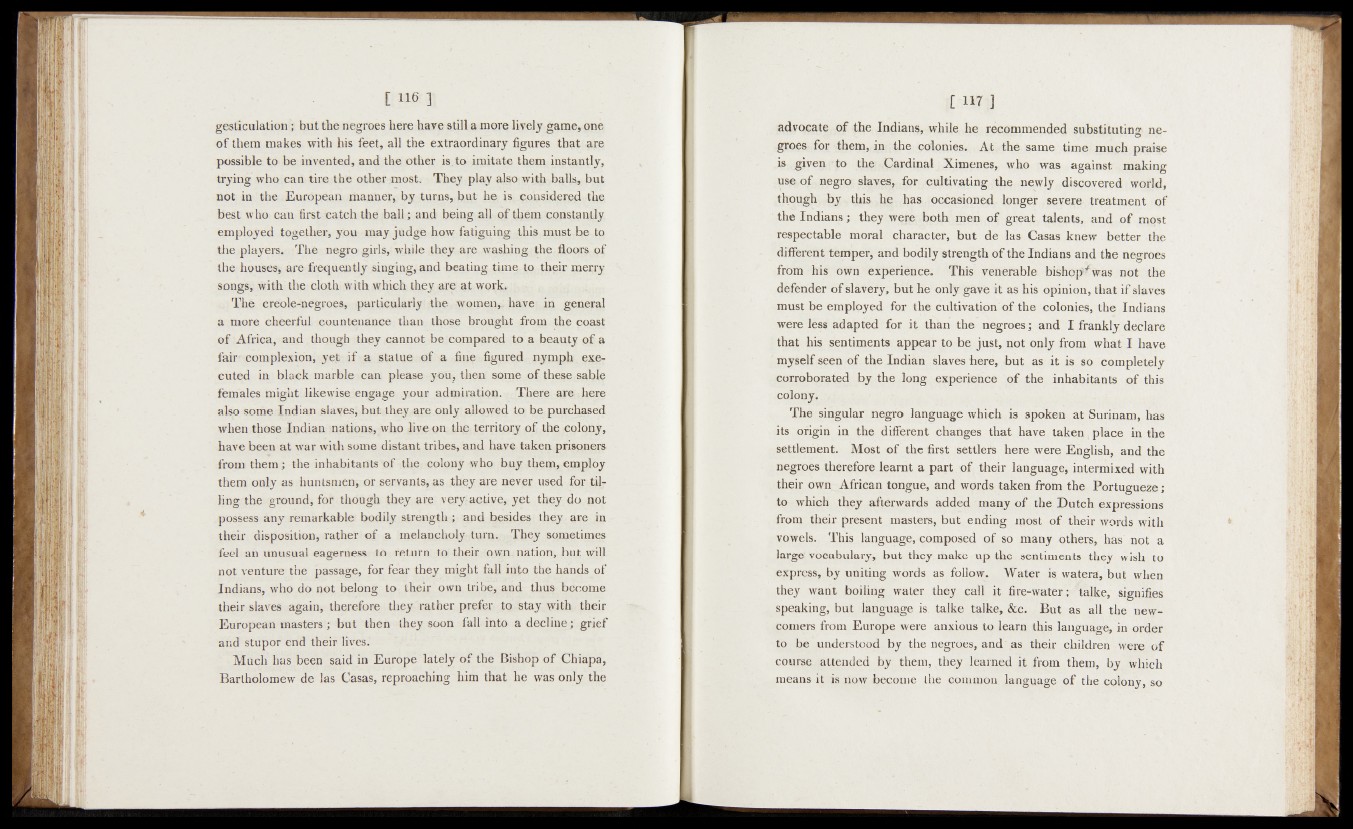
gesticulation ; but the negroes here have still a more lively game, one
of them makes with his feet, all the extraordinary figures that pre
possible to be invented, and the other is,to imitate them instantly,
trying who can tire the other .most. They play also with balls, but
not in the European manner* by turns, but he is considered the
best who can first catch the ball ] and being all of them constantly
employed together, you may judge how fatiguing this must be to
the players. The negro girls,' while they are washing the floors of
the houses, are frequently singing, and beating time to their merry
songs, with the cloth with which they are at work*; •>
The creole-negroes, particularly the women,* have in general
a more cheerful countenance than those brought from, the coast
of Africa, and though they cannot be compared to a beauty of a
fair complexion, yet if a statue of a fine figured nymph executed
in black marble can please you, then some of these sable
females might likewise engage your admiration. There are here
also some Indian slaves, but they are only allowed to be purchased
when those Indian nations, who live on the territory of the colony,
have been at war with some distant tribes, and have taken prisoners
from them; the inhabitants of the colony who buy them, employ
them only as huntsmen; or servants, as Jhey are never used for tilling
the ground, for though they are very active, yet they do pot
possess any remarkable bodily strength; and besides they are in
their disposition, rather of a melancholy tum^They sometimes
feel an unusual eagerness to. return to their own.nation, but will
not venture the passage, for fear they might fall into the hands of
Indians, who do not belong to: their own tribe, and thus become
their slaves again, therefore they rather prefer to stay with their
European masters; but then they soon fall into a decline; grief
and stupor end their lives.'
Much has been said in Europe lately of the Bishop of Chiapa,
Bartholomew de las Casas, reproaching him that he was only the
advocate of the Indians, while he recommended substituting negroes
for them, in the colonies. At the same time much praise
is given to the: Cardinal Ximenes, who was against making
use of . negro slaves, for cultivating the newly discovered world,
though, by this he has occasioned longer severe treatment of
the Indians; they were both men of great talents, and of most
respectable moral character, but de las Casas knew better the
different temper, and bodily strength of the Indians and the negroes
from his own experience. This vénérable bishopfwas not the
defender of slavery, but he only gave it as his opinion, that if slaves
must be employed for the cultivation of the colonies, the Indians
were less adapted for it than the negroes ; and I frankly declare
that his sentiments appear to be Jpst, not only from what I have
myself seen of the Indian slaves here, hut as it is so completely
corroborated by the long experience of the inhabitants of this
colony.
The singular negro language which is spoken a t Surinam, has
its origin in the different changes that have taken, place in the
settlement. Most of the first settlers here were English, and the
negroës therefore learnt a part , of their language, intermixed with
their own African tongue, and words taken from the Fortugueze ;
to which they afterwards added many of the Dutch expressions
from their present masters, but ending most-of their words with
vowels. This language, composed of so mapy others, has not a
large vocabulary, but they make up the sentiments they wish to
express, by uniting words as follow. Water is. waters, but when
they want boiling water they call it fire-water ; -talke, signifies
speaking, but language is. talke talke, Sec. But as all the newcomers
from Europe were anxious to learn this language, in order
to be understood by the negroes, and'.as their children were of
course, attended by them, they learned it from them, by which
means it is now become the common language of the colony, so